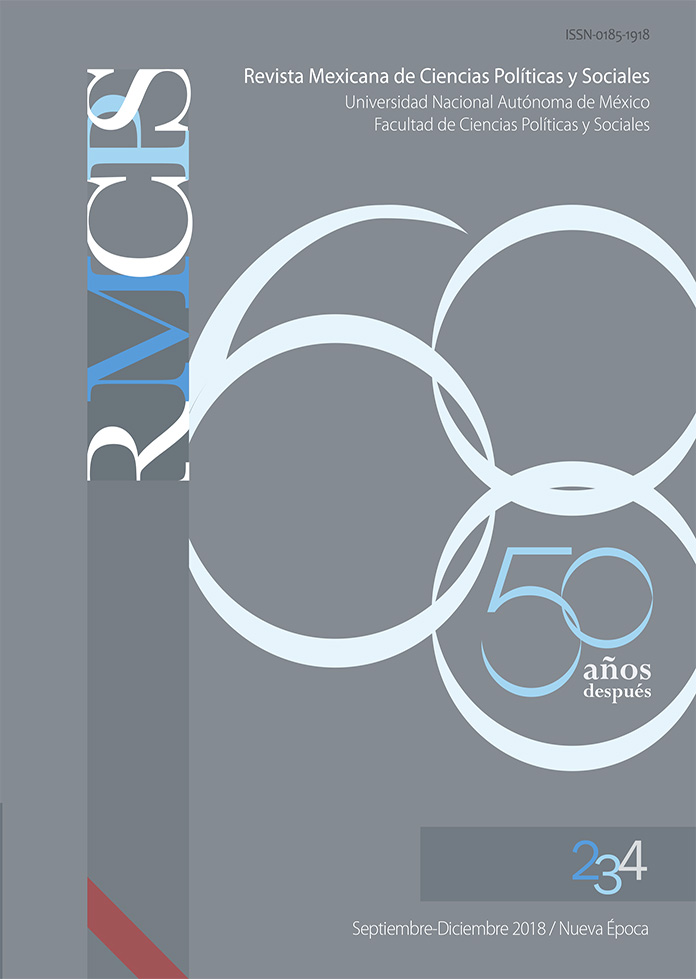Irony and Dialectics: One-dimensional Man and 1968
Contenu principal de l'article
Résumé
In this article, the author analyses the role of irony in one of the texts that had the most influence in the 1968 movements around the world: The One-dimensional Man, by Herbert Marcuse. Understanding irony as an evident sign of human two-dimensionality, and emphasizing its dialectical potential, the author questions the subversive viability and the specific characteristics of every type of irony. To conclude, he focuses in the operability of irony in Marcuse’s work to encourage resilience and increase the possibility of inspiring political engagement through it.
Téléchargements
Renseignements sur l'article
Références
Adorno, Theodor W. (1974) Minima Moralia: Reflections from Damaged Life [trans. E.F.N. Jephcott]. London: Verso.
Adorno, Theodor W. (1978) Minima Moralia: Reflections from Damaged Life [trans. E.F.N. Jephcott]. London: Verso.
Aronson, Ronald (1971) “Dear Herbert” in Fischer, George (ed.) The Revival of American Socialism. New York and London: Oxford University Press.
Bernstein, J.M. (1984) The Philosophy of the Novel: Lukács, Marxism and the Dialectics of Form. Minneapolis: University of Minnestoa Press.
Bewes, Timothy (1997) Cynicism and Postmodernity. London: Verso.
Delfini, Alex and Paul Piccone (1986) “Our Mitchell Franklin” Telos (70): 53-57. DOI: 10.3817/1286070053.
Ferguson, Harvie (1995) Melancholy and the Critique of Modernity: Søren Kierkegaard’s Religons Psychology. London: Routledge.
Franklin, Mitchell (1970) “The irony of the beautiful soul of Herbert Marcuse” Telos (6): 3-35.
Habermas, Jürgen (1985) Die Neue Unübersichtlichkeit. Frankfurt: Suhrkamp.
Hegel, G.W.F. (1920) The Philosophy of Fine Art, vol. I. London: G. Bell and Sons, Ltd.
Kellner, Douglas (1988) “Herbert Marcuse’s reconstruction of Marxism” in Pippin, Robert; Feenberg, Andrew, and Charles Webel (eds.) Marcuse: Critical Theory and the Promise of Utopia. South Hadley: Macmillan Education, pp. 169-188.
Lear, Jonathan (2011) A Case for Irony [with commentary by Cora Diamond, Christine M. Korsgaard, Richard Moran and Robert A. Paul]. Cambridge: Cambridge University Press.
Lethen, Helmut (2002) Cool Conduct: The Culture of Distance in Weimar Germany [trans. Don Reneau]. Berkeley: University of California Press.
Marcuse, Herbert (1978) The Aesthetic Dimension: Toward a Critique of Marxist Aesthetics. Boston: Beacon Press.
Marcuse, Herbert (1991) One-dimensional Man: Studies in the Ideology of Advanced Industrial Society [2nd ed.]. Boston: Beacon Press.
Menke, Christoph (2009) Tragic Play: Irony and Theater from Sophocles to Beckett [trans. James Phillips]. New York: Columbia University Press.
Newmark, Kevin (2012) Irony on Occasion: From Schlegel and Kierkegaard to Derrida and de Man. New York: Fordham University Press.
Rorty, Richard (1989) Contingency, Irony and Solidarity. Cambridge: Cambridge University Press.
Rose, Gillian (1978) The Melancholy Science: An Introduction to the Thought of Theodor W. Adorno. New York: Radical Thinkers.
Saler, Michael T. (2004) “Modernity, disenchantment, and the ironic imagination” Philosophy and Literature, 28 (1): 137-149. DOI: 10.1353/phl.2004.0012.
Shapiro Jeremy J. (1970) “One-dimensionality: The universal semiotic of technological experience” in Breines, Paul (ed.) Critical Interruptions: New Left Perspectives on Herbert Marcuse. New York: Viking Press.
Sloterdijk, Peter (1988) Critique of Cynical Reason [trans. Michael Eldred]. Minneapolis: University of Minneapolis Press.
Taylor, Mark C. (1980) Journeys to Selfhood: Hegel and Kierkegaard. Berkeley: Fordham University Press.
Voigts, Hanning (2010) Entkorkte Flaschenpost: Herbert Marcuse, Theodor W. Adorno und die Streit um die Neue Linke. Berlin: LIT.

La Revista Mexicana de Ciencias Políticas y Sociales publicada por la Universidad Nacional Autónoma de México se distribuye bajo una Licencia Creative Commons Atribución-NoComercial-SinDerivar 4.0 Internacional.
Basada en una obra en http://www.revistas.unam.mx/index.php/rmcpys/
La RMCPyS autoriza a sus colaboradores que suban una copia de sus trabajos publicados en sus webs personales o en cualquier repositorio de acceso abierto, siempre y cuando se mencione específicamente a la Revista Mexicana de Ciencias Políticas y Sociales como fuente original de procedencia, citando el año y número del ejemplar respectivo y añadiendo el enlace a la página web donde este órgano editorial puede ser consultado in toto, de manera abierta y gratuita en: <www.revistas.unam.mx/index.php/rmcpys>.
Las y los lectores tienen libertad para:
Compartir, copiar y redistribuir el material en cualquier medio o formato.
El licenciante no puede revocar estas libertades en tanto usted siga los términos de la licencia.
De acuerdo con los siguientes términos:
- Atribución: la/el lector/a debe reconocer el crédito de una obra de manera adecuada, proporcionar un enlace a la licencia, e indicar si se han realizado cambios. Puede hacerlo en cualquier forma razonable, pero no de forma tal que sugiera que tiene el apoyo del licenciante o lo recibe por el uso que hace.
- No comercial: la/el lector/a no puede hacer uso del material con fines comerciales.
- Si se mezcla, transforma o se desarrolla a partir de la obra licenciada, no se permite la distribución del material modificado.
Cargos por gestión de artículos
La Revista Mexicana de Ciencias Políticas y Sociales NO cobra tarifas por recibir, procesar o publicar los artículos (Article Processing Charge [APC]) enviados por los autores.

